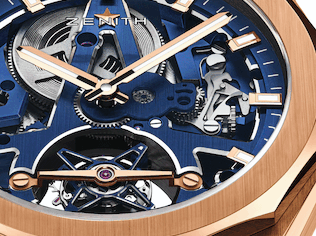It was back in the 1400s when the great Leonardo da Vinci brought into discussion the idea of a perpetual motion machine, a device that could run on its own in perpetuity, without requiring any human intervention to fuel the process.
It was this challenge that saw the invention in 1928, of the Atmos Clock by Swiss engineer Jean-Léon Reutter, nearly attaining perpetual movement, able to function for a theoretically unlimited time, with nearly zero energy and human intervention.
Manufactured by Jaeger-LeCoultre in Switzerland, the Atmos is essentially a mechanical torsion pendulum clock which does not need to be wound manually. It gets the energy it needs to run simply from temperature and atmospheric pressure changes in the environment, hence the name "Atmos."
Its power source is an internal hermetically sealed capsule containing a mixture of gaseous and liquid ethyl chloride, which expands into an expansion chamber as the temperature rises, compressing a spiral spring; with a fall in temperature the gas condenses and the spring slackens. This motion constantly winds the mainspring. A temperature variation of only one degree in the range between 15 °C (59 °F) and 30 °C (86 °F), or a pressure variation of 3 mmHg, is sufficient for two days' operation.
In order to run the clock on this small amount of energy, everything inside the Atmos has to work in as friction-free a manner as possible. For timekeeping it uses a torsion pendulum, which consumes less energy than an ordinary pendulum. The torsion pendulum executes only two torsional oscillations per minute, which is 1/30 the rate of the pendulum in a grandfather clock. Source: Wikipedia

Since then, the Atmos clock has been continually perfected in the workshops of the Jaeger‑LeCoultre Manufacture ever since.
Atmos cabinets have evolved with time. Some of the first Atmos clocks feature an Art Nouveau style, showcasing opalescent glass engraved with floral motifs or a golden wood cabinet embellished with plant motifs. Later, Art Deco lent pure, geometric lines to bronze and wood cabinets. The metallic and more imposing clocks of the 1970’s are a reflection of the period’s style. The 2000's introduced glass and transparency to reveal the mechanism of the clock with even more elegance.
Timeless and iconic, the Atmos has become a source of inspiration, a creative canvas.
Alongside Jaeger‑LeCoultre, great designers have imagined limited editions of this clock.

Australian designer Marc Newson who had designed several models in glass cabinets, now gives the Atmos - his third - a new contemporary design.
To give the Atmos a near transparent view, to allow light to shine directly on the Atmos without altering its colours, Newson has chosen to use an "extra-clear" glass for the cabinet made by Baccarat, the 250-year old French maker of high-end crystal glassware.
Almost invisible, it offers remarkable transparency, which showcases the clock in an unprecedented manner.
On both the interior and the exterior, fluid lines running down both the interior and exterior, as well as the use of blue in the numerals alongside two-tone hands, reveal the signature of Newson.
On the back of the movement is the designer's secret signature.



With the Jaeger-LeCoultre Caliber 568 inside, the Atmos houses 211 components, and is truly an exquisite creation worthy of presidents, prime ministers, artists of worldwide reputation and even popes, whose offices it has adorned amongst many leading figures of the modern age.

The Atmos 568 by Marc Newson Baccarat Crystal is available at US$28,000.















